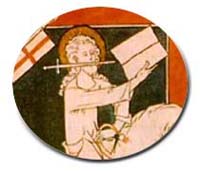Condemnation of Opponents to the Papal States
Some traditionalists are not aware of the gravity of the loss of Papal States. This knowledge, however, is of importance for anyone who wants to follow the Catholic cause from a historical perspective. Indeed, the attack of Freemasonry to usurp the Papal States through its agents Victor Emmanuel, Garibaldi and Mazzini represented an enormous victory for the Revolution and a blow to more than 1,000 years of Catholic History. Attempting to help fill this gap, today we present two documents of Pius IX stressing how important it is for the Church to have Papal States.
Pius IX
1. We must now present our grievances and censures aimed at those who applaud that decree whereby the Roman Pontiff is deprived of all dignity and temporal power and affirm that this decree is the most efficacious means to procure the Church’s well-being and liberty. Here we declare in a loud voice that it is neither the desire to command nor personal regret for the loss of our temporal power that inspires our words, since our way of being and acting are far removed from all spirit of domination.
Nonetheless, the duties of our mission require that, to protect the temporal authority of the Apostolic See, we must defend with all our strength the rights and possessions of the Holy Roman Church and the liberty of this See, which is inseparable from the liberty and interests of the whole Church.
Those men who applaud this decree speak falsehoods and absurdities when they ignore - or pretend to ignore - that when the Roman Empire was divided into many kingdoms and powers, it was by the singular design of Divine Providence that the Roman Pontiff would have civil power. Indeed, since Our Lord Jesus Christ confided to the Roman Pontiff the government and direction of the whole Church, it is fitting that, in order to govern her and protect her unity, he should benefit from that plenitude of liberty proper to the fulfillment of his Apostolic ministry.
Everyone knows, in effect, that faithful peoples, nations and kingdoms would lack complete confidence in the Roman Pontiff and he would not obtain their full obedience should they see him subjected to the dominion of a foreign Prince or government and deprived of his liberty. They would fear the Pontiff could conform his actions to the will of the Prince or State in whose territory he lived, and, under this pretext they could often oppose his actions.
(Pius IX, Allocution Quibus quantisque, April 20, 1849
Receuil des allocutions consistoriales..., Paris: Adrien le Clere, 1865 p. 225)
2. The state of affairs has reached such a point that, following in the footsteps of our predecessors, we must make use of that supreme authority God gave us to bind and loosen, and exercise severity with those who are culpable in order to give a salutary example to others.
This is why, after having implored the enlightenment of the Holy Ghost in private and public prayers and after having received the advice of a special congregation of our venerable brethren, the Cardinals of the Holy Roman Church, by the authority of Almighty God, of the Holy Apostles Peter and Paul, and our own authority, we declare that:
- All those who took part in the rebellion, usurpation, occupation and criminal invasion of the mentioned provinces of our States …
- Likewise the agents, executors, collaborators, advisers and supporters and any others, who, under any pretext or in any way whatsoever, assisted in the mentioned events or executed them,
Do thus incur the excommunication and the other ecclesiastical censures and penalties dictated by the sacred canons, apostolic constitutions and decrees of the general councils, namely, the Holy Council of Trent (ses. XXI, chap. 11), and we, once again, excommunicate and anathematize them.
At the same time, we deprive them of all privileges, benefits, and indults accorded to them in any way whatsoever either by us or our predecessors. We further determine that they cannot be released from these censures by any person other than us or another Roman Pontiff – except in danger of death, and should they recover they would again fall under censure. We declare that they should not receive absolution until they publicly retract, revoke, undo and annul all such attacks, having completely and effectively re-established everything to its original state and given satisfaction to the Church, to us and to the Holy See by means of a proportionate penance for their crimes.
For this reason, we decree and declare, by this document, that not only the culpable who are particularly mentioned in it, but also their successors in the places they occupy, can under no pretext believe that they are excepted and dispensed … [from the mentioned public reparation] to the Church, to us and to the Holy See. On the contrary, we desire that, by the present document, such obligation should retain all its force should they ever seek the benefit of absolution.
(Pius IX, Apostolic Letter Cum Catholica, March 26, 1860
Recueil pp. 405-406)

Posted February 15, 2010


Related Topics of Interest
 The Grandeur of Pius IX Defending the Papal States The Grandeur of Pius IX Defending the Papal States
 The Carolingian Donation for the Papal States The Carolingian Donation for the Papal States
 The Colors of the Papal Flag The Colors of the Papal Flag
 The 500th Anniversary of the Swiss Guard The 500th Anniversary of the Swiss Guard
 Vatican II Turnaround on Church-State Relations Vatican II Turnaround on Church-State Relations
 Religious Liberty, a 'Monstrous Right' Religious Liberty, a 'Monstrous Right'
 Liberty of Conscience: a 'Delirium' Liberty of Conscience: a 'Delirium'
 When Liberty Becomes an Evil When Liberty Becomes an Evil
 At Lourdes Pope Bows to Liberty, Equality, Fraternity At Lourdes Pope Bows to Liberty, Equality, Fraternity
 Hillaire Belloc the Liberal - His Thinking on the French Revolution Hillaire Belloc the Liberal - His Thinking on the French Revolution

Related Works of Interest
|
|